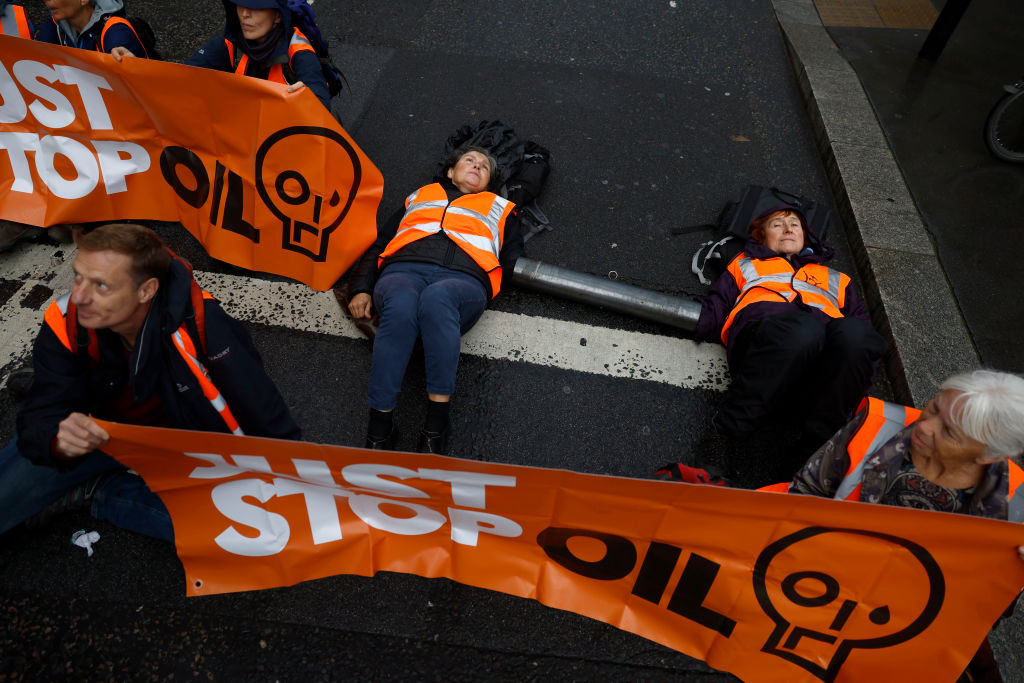Analysis: Sunak is giving the police exactly what they want with protest laws

Just Stop Oil, Extinction Rebellion and other protest groups will face even tougher criminal sanctions under the Public Order Bill. But our ability to demonstrate could come under the hammer too, Sascha O’Sullivan writes.
“Police have welcomed new powers to crack down on protestors,” a BBC Radio 4 news bulletin said this morning.
Now I’ve always had a slightly belligerent streak, rejoicing whenever someone says “actually, Wordle is terrible” or openly admitting to loving Twitter.
But the day I’m really looking forward to is one which will likely never materialise: when the police say “you know what, we’re fine, we don’t need more powers”.
This morning Conservative MPs followed their marching orders and dutifully posted out a series of messages in support of the amendment to the Public Orders Bill (a piece of legislation which every Guardian columnist will say “The Media Isn’t Covering This”, despite being part of the media and covering it.)
The amendment will give clearer orders on when the police can shut down protests and what is considered seriously disruptive, for example “slow marching” which does what it says on the tin. There will be a slew of new criminal offences, including for those who glue or chain themselves to objects.
The problem, which has been pointed out in several corners of The Media Not Covering the Public Order Bill, is that most of the largely weird things members of Extinction Rebellion and other protesters do is already illegal.
Blocking highways? Illegal. Smashing windows? Illegal. Throwing soup at paintings? Illegal. Stopping printers from delivering newspapers? Illegal.
Indeed, even without explicit powers, the police have continually surpassed what they are allowed to do, arresting journalists last year for the crime of knowing a protest was happening (their job) and then covering it (also their job).
There have always been wings of protest groups which skirted the limits of and broke the law. There have also been many peaceful protests turned into chaos because of how the police handled it (see: candlelit vigil for Sarah Everard). There have also been protesters who have put themselves at risk to help others and prevent violence breaking out (see: Black Lives Matter protester pulling a far-right demonstrator out of harm’s way).
Sunak then has made this public order bill one of the hills he wants to die on, with little real reward other than the ephemeral promise of being seen to do something. If it was only for the sake of pissing off the lefties and digging in on the culture wars, there might be some electoral gain for Sunak. But David Davis, hardly a bleeding heart progressive, called the new laws an “encroachment on our civil liberties”.
Clearly, people should not be dying because of Just Stop Oil protests blocking roads. Nor should the free press be blocked from printing papers. There needs to be some level of negotiation between the police and protest groups about ensuring emergency vehicles are able to pass through, no matter the circumstances. Egregious attacks on the free press were forcefully condemned.
Even with tougher penalties or more specific crimes, protest groups will continue to break the law. The cost then is a much more existential one to the functioning of democracy in the UK and an increasingly antagonistic attitude towards the police.
The police have enough problems implementing the powers they already possess, so maybe today, in an alternative universe, a top cop might just say: thanks but no thanks.
